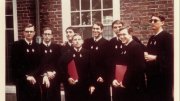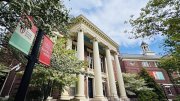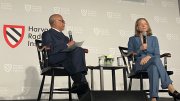The year they enrolled at Harvard, John F. Kennedy was inaugurated as the 35th president of the United States of America. In the 60 years since their graduation, they have experienced radical changes in women’s rights, economic highs and lows, and the Vietnam War. Now in their ninth decade, they look towards the future with hope and a sense of responsibility.
On June 5th, the Harvard and Radcliffe classes of 1965 gathered for their 60th reunion at Emerson Hall, where classmates Joel Cohen, Ilene H. Lang, Howard Gardner, and Nancy Blackmun led a symposium, “Tectonic Changes in Our Lives Since 1961,” moderated by Alison Brooks and organized by Charles Styron (both also members of the class of ’65). The four principal speakers each gave 15-minute presentations on topics ranging from the U.S. in a global perspective to women in the workplace.
Cohen, a professor at The Rockefeller University and Columbia University, studies “human and non-human populations quantitatively.” In his presentation, “Tectonic Changes 1960-2025: U.S. in Global Perspective,” he shared statistics demonstrating change in four areas: growing economic inequality in the United States; fracturing families in the U.S.; general education from an international perspective; and U.S. health and longevity as compared to other countries. The data Cohen presented paint a stark picture:
- In 1965, CEOs made about 20 times as much as the median worker, but they now make about 250 times as much;
- The percentage of children in father-missing households in the U.S. grew from 14 percent in 1970 to 25 percent in 2023;
- The math and reading scores of the bottom 50 percent of U.S. students have fallen since 2011; and
- In terms of life expectancy, the United States ranked 20th in the world in 1960, 40th by 2015.
“Most of these trends have gone on for half a century: more economic inequality, increased isolation, decreased familial support, general education falling behind our peers, health and longevity falling behind our peers,” said Cohen. “I ask you: is this the country we want?” “No,” the audience responded.
Then it was Lang’s turn. A tech executive, entrepreneur, and feminist, she served as the president of Catalyst, a nonprofit organization that tracks and publishes reports on women's progress up the corporate ladder. In her presentation on women’s rights and women in the workplace, she presented research by Lee professor of economics Claudia Goldin outlining 155 critical moments—from 1905 to 2023—in the history of women’s rights. Nearly half took place from 1963 to 1973. “Catalyst’s model was ‘fix the workplace, not the women,’” explained Lang. “We did not say, ‘fix the men.’”
Catalyst conducted a series of studies on the effect of mentoring for advancing women’s careers, and then turned its attention, said Lang, to “what makes a difference beyond mentoring.” Sponsorship, that additional research found, “is the most effective” means of ensuring advancement. “And when I say sponsorship,” she continued, “that means somebody in power raising their hand, saying, ‘This is the person…to promote into that job.’”
Hobbs research professor of cognition and education Howard Gardner spoke next, in a presentation titled, “The End of the Anthropocene?”
Gardner—whom Brooks described as someone who “came to Harvard in 1961 and never left”—defined the ‘Anthropocene’ as a distinct geological time interval when human activities have had an environmental impact on the Earth. He gave examples of how the Anthropocene could end: with climate change, nuclear war, or AI, misused. Unless people learn to disagree nonviolently he said, citing a key teaching of Mahatma Gandhi, “we’re going to destroy our species and perhaps the planet.”
“I hope…that Gandhi's spirit, as manifest by Martin Luther King Jr., Nelson Mandela,” and others, he concluded, “will become more prominent.”
Blackmun, a psychologist trained in group dynamics, couples therapy, and psychoanalysis, gave the final presentation. “What I have to say is dark,” she began, “but it does move towards some light. In our last class report, many of you expressed worry about the country, the world, and the whole planet. This time, worry has increased to real anxiety, and more of you expressed it.” She asked classmates to think back on the upheavals that gripped the country during the late 1960s. “While not like the current head-spinning avalanche of events, there were major earthquakes right through the first decade after we graduated.” She described the civil rights movement and its backlash of violence as well as Vietnam War protests.
Having set the mood for self-reflection, Blackmun pushed on, shifting the subject to the current political polarization in the United States. “What if we take a look at ourselves like couples?” she asked. “Those on the other side of the divide can see things about us that we don’t see—things that can be pretty uncomfortable. We got into this college because we were really smart. Our wonderful education made us even smarter and facilitated our subsequent success. Have we been immersed in certainty about our superiority, even if our work has been devoted to caring for others? Have we ignored half the nation, if we even noticed them?”
Finally, Styron, in his closing remarks, noted that “prodigious minds like those of Joel, Ilene, Howard, Nancy, and Allison are prima facie evidence that we as human beings have the talent and the intellectual capital to do what we need to do. Whether we’ll do it or not is another thing, but we have what we need to tackle [these issues].” Therefore, he said, “it is the responsibility for all of us going forward in these latter years of our lives to gracefully and joyfully join the adventure.”









